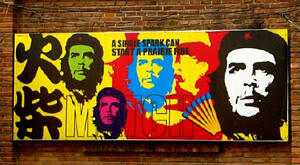After the fall of the Berlin Wall, the vast socioeconomic and political changes that swept across Eastern Europe and the former Soviet Union engendered a new and interdisciplinary body of scholarship identified as the study of “postsocialism.” This conference asks: What does it mean to adopt a postsocialist theoretical position, particularly in regions of the world beyond Europe that might be described as “still” or “neo” socialist, but which also have embraced a capitalist market economy? Can we speak of commonalities in analytical standpoints and everyday experiences across national, spatial, and temporal boundaries? Is it possible to engage in “comparative post/socialisms” – that is, to identify and compare characteristics of late-and/or-post socialist cultures and state regimes? And what might be the limitations of such an approach?
Panel II: Mimesis, Memory, Music
Lynda Bell (Dept. of History, UCR) “Can the Revolution Be Curated? Rubrics of Memory in Post/Socialist Beijing," a paper on the newly reconfigured exhibit on modern Chinese history at the National Museum of China in Beijing (the old Museum of the Chinese Revolution).
*Lynda Bell is one of three speakers for this panel. Please visit the website for more information.

